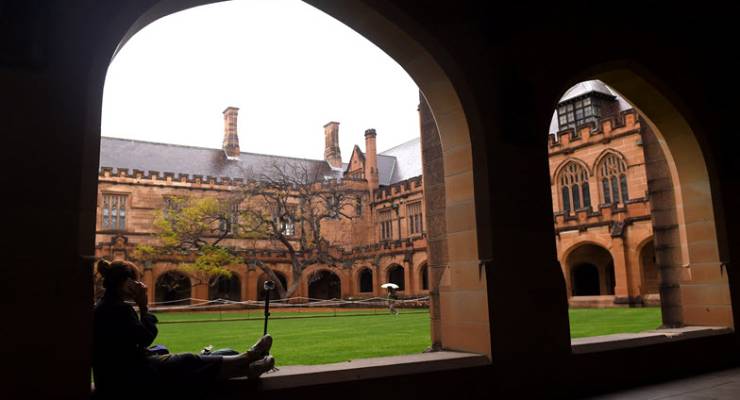
Over the weekend, former High Court Chief Justice Robert French AC quietly released his long-awaited report into freedom of speech on campus.
The report, which came after a four month review, concluded that there is no systemic freedom of speech crisis on Australian university campuses. But the reporting on French’s conclusions has been wildly divergent — while the Nine papers reported that there was “no freedom of speech crisis”, The Australian focused on the fact that French endorsed a national code to protect freedom of speech.
Despite French’s comprehensive probe, the review has not helped cool the culture war around universities which led to its inception.
Why was there a report?
The idea that university campuses are becoming hostile to free speech and filled with censorious, overly-sensitive students is an increasingly common right-wing trope right across the western world. There is ample evidence that despite getting considerable media and political attention, the free speech campus crisis is wildly overblown.
Still, the campus culture war is a pet project of Dan Tehan, who became education minister following a reshuffle late last year. Tehan was particularly troubled by an incident at the University of Sydney involving right-wing commentator Bettina Arndt, who has been travelling the country to tell students that figures about sexual assault on campus are inflated and fake. When Arndt’s talk at the Sydney University Liberal Club was met with vigorous protests, she became a conservative cause célèbre. In response, Tehan argued that protestors should have to pay for security costs at such events. Other incidents included the University of Western Australia’s decision to cancel a talk by Quentin Van Meter, an American anti-transgender commentator.
Tehan announced the French probe in November, much to the annoyance of university leaders, who argued the “crisis” discourse was misleading and exaggerated. The French probe pointed to a shift in ministerial priorities. Tehan’s predecessor Simon Birmingham had been in talks with activists to create a taskforce to scrutinise universities’ responses to sexual assault and harassment. This was quietly shelved under Tehan, who chose instead to focus on freedom of speech.
What the report said
On the very first page of his report, French writes that “claims of a freedom of expression crisis on Australian campuses are not substantiated”. The report goes on to state that the relatively isolated incidents over a number of years do not add up to a systemic problem. However French did recommend the adoption of a national code to deal with freedom of expression issues on campus, as was flagged in the review’s terms of reference. French also recommended relatively small, non-essential statutory changes to highlight the importance of free speech in relevant legislation.
How it was reported on
There seems to be something for everyone in French’s 300-page report. The Nine papers reported that there was “no freedom of speech crisis”, based on French’s initial conclusion, but also mentioned recommendations of a national code. They quoted university sector spokespeople, who said the report was clear evidence that there was no free speech crisis on Australian campuses.
Meanwhile, The Australian’s exclusive on the report made no mention of this key conclusion, focusing entirely on the recommendation to implement a model code. In a comment piece based on an incredibly strained and selective reading of the report, The Australian’s Janet Albrechtsen warned readers not to be fooled by universities’ attempts to spin the report as a positive.
According to Albrechtsen, French observed, more than once, that perceptions of a free speech crisis are enough to create a “chilling effect” on the flow of ideas. Except he didn’t. The phrase “chilling effect” only appears twice in the report, and in both instances, is used in inverted commas to quote the findings of separate committees. She even managed to construe French’s recommendations as a sly attack on section 18C of the Racial Discrimination Act, another obsession of the Australian right.
French’s conclusion should have been enough to hose down many of the hysterical fears about free speech on campus. But 300 pages gives commentators plenty of opportunity to cherry pick a reading that affirms their worldview.
What do you think about French’s findings? Let us know at boss@crikey.com.au. We reserve the right to edit comments for length and clarity. Please include your full name if you would like to be considered for publication.








As we seen so often in Australia the only free speech that matters to the Murdoch Corp is THEIR free Speech if you criticize them in a public forum they will come after you with gun blazing
the sooner the Murdoch criminal gang is run out of town on a rail the better off we all will be we might be lucky & get some decent papers out of it
The right are never going to admit they’re wrong on this because why would they? It sells papers and that’s their business.
The proposed national code is probably a good idea but will be instantly labelled as cultural marxist propaganda unless it protects their mates rights to say what they want with impunity.
Free speech for those that agree and condemnation on anyone with the temerity to dissent.
Seems to be a very old, tattered copy of the mudorc’s agenda.
Surely it wasn’t French who released his report, but the Government, reportedly after some delay.
The irony, the unacknowledged hypocrisy, of the right’s position is essentially that they should be free to say anything, anywhere, anytime, without the slightest demur, protest or objection from anyone ever.
Real champions of free speech.
By the way, Bettina Arndt has a point. She isn’t just whistling Dixie.